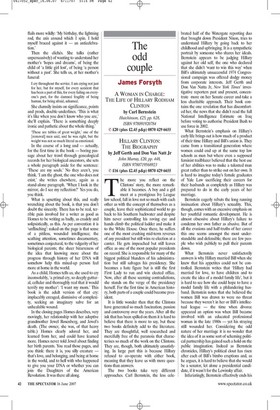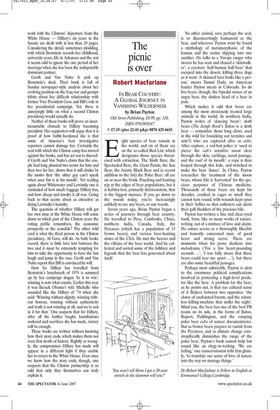The odd couple
James Forsyth A WOMAN IN CHARGE: THE LIFE OF HILLARY RODHAM CLINTON by Carl Bernstein Hutchinson, £25, pp. 628, ISBN 978091920784 © £20 (plus £2.45 p&p) 0870 429 6655 HILLARY CLINTON: THE BIOGRAPHY by Jeff Gerth and Don Van Natt Jr John Murray, £20, pp. 448, ISBN 9780719568923 © £16 (plus £2.45 p&p) 0870 429 6655 The more you reflect on the Clintons' story, the more remarkable it becomes. A boy and a girl meet at a prestigious Ivy League law school, fall in love not so much with each other as with the concept of themselves as a couple, leave their sophisticated world to go back to his Southern backwater and despite him never controlling his roving eye and hands climb the political ladder and make it to the White House. Once there, he suffers one of the most crushing mid-term reverses of any president but still wins re-election at a canter. He gets impeached but still leaves office as one of the most popular presidents on record. She is responsible for many of the biggest political blunders of his administration but still salvages his presidency. She becomes a hate figure but is still the first First Lady to run and win elected office. Now, after all these seeming contradictions, she stands on the verge of the presidency herself. For the first time in American history, both parts of a couple could become president.
It is little wonder then that the Clintons have generated so much fascination, passion and controversy over the years. After all the ink that has been spilled on them it is hard to believe that there is more to say, but these two books definitely add to the literature. They are thoughtful, well researched and mercifully free of the paranoia that characterises so much of the work on the Clintons. They are, though, both ultimately unsatisfying. In large part this is because Hillary refused to co-operate with either book, meaning that they leave us with more questions than answers.
The two books take very different approaches. Carl Bernstein, the less celebrated half of the Watergate reporting duo that brought down President Nixon, tries to understand Hillary by going back to her childhood and upbringing. It is a sympathetic portrait by someone who shares her ideals. Bernstein appears to be judging Hillary against her old self the one who declared that she didn't 'want to win this way' when Bill's ultimately unsuccessful 1974 Congressional campaign was offered dodgy money from corporate interests. Jeff Gerth and Don Van Natta Jr, New York Times' investigative reporters past and present, concentrate more on her Senate career and take a less charitable approach. Their book contains the one revelation that has discomforted her, the news that she didn't read the full National Intelligence Estimate on Iraq before voting to authorise President Bush to use force in 2002.
What Bernstein's emphasis on Hillary's early life brings out is how much of a product of their time Hillary and Bill's union is. They came from a transitional generation where women could end up at the same top law schools as men but where even a supposed feminist trailblazer believed that the best use of her abilities was to make a talented man great rather than to strike out on her own. It is hard to imagine today's female graduates of Yale Law sacrificing their careers for their husbands as completely as Hillary was prepared to do in the early years of her marriage.
Bernstein eagerly rebuts the long running insinuation about Hillary's sexuality. This, though, comes with an excessive emphasis on her youthful romantic development. He is almost obsessive about Hillary's failure to condemn her own father as abusive. But of all the evasions and half-truths of her career this one seems amongst the most understandable and defensible; there are few people who wish publicly to pull their parents down.
What Bernstein never satisfactorily answers is why Hillary married Bill when she knew that his appetites could not be controlled. Bernstein writes that 'Hillary had married for love, to have children and to create the idea of a model family life', but it is hard to see how she could hope to have a model family life with a philandering husband. Bernstein notes that she believed the women Bill was drawn to were no threat because they weren't in her or Bill's intellectual league — the time when divorce appeared an option was when Bill became involved with an educated professional woman in the late 1980s — yet his straying still wounded her. Considering the odd nature of her marriage it is no wonder that the idea of it as some sort of scheming political partnership has gained such a hold on the public imagination. Indeed as Bernstein chronicles, Hillary's political clout has risen after each of Bill's bimbo eruptions and, as he argues, it is hard to believe that she would be a senator, let alone a presidential candidate, if it wasn't for the Lewinsky affair.
Infuriatingly, Bernstein effectively ends his work with the Clintons' departure from the White House — Hillary's six years in the Senate are dealt with in less than 20 pages. Considering the detail, sometimes plodding, with which Bernstein records her childhood, university years, life in Arkansas and the rest it seems odd to ignore the one period of her marriage when she has been the indisputably dominant partner.
Gerth and Van Natta Jr pick up Bernstein's slack. Their book is full of Sunday newspaper-style analysis about her evolving position on the Iraq war and gossipy titbits about her difficult relationship with former Vice-President Gore and Bill's role in her presidential campaign. Yet, there is annoyingly little on what a second Clinton presidency would actually do.
Neither of these books will prove an insurmountable obstacle to Hillary becoming president. Her supporters will argue that it is proof of how battle-hardened she is that some of America's best investigative reporters cannot damage her. Certainly the zeal with which the Clinton camp has moved against the books, and has set out to discredit Gerth and Van Natta's claim that the couple had long planned two terms for him and then two for her, shows that it still abides by the motto that `the other guy can't speak when your fist is in his mouth'. Yet reading again about Whitewater and Lewinsky one is reminded of how much baggage Hillary has, and how cheap and tawdry it all was. Going back to that seems about as attractive as doing Lewinsky's laundry.
The question of whether Hillary will get her own time at the White House will come down to which part of the Clinton years the voting public remembers, the economic prosperity or the scandals? The other wild card is what the third person in the Clinton presidency, Al Gore, will do. As both books record, there is little love lost between the two and it must be extremely tempting for him to take the opportunity to have the last laugh and jump in the race. Gerth and Van Natta report that Bill is convinced he will.
How far Hillary has travelled from Bernstein's benchmark of 1974 is summed up by her campaign slogan 'In it to win': winning is now what counts. Earlier this year it was Barack Obama's wife Michelle who sounded like the Hillary of '74 when she said: 'Winning without dignity, winning without honour, winning without authenticity and truth is not winning at all, and we're not in it for that.' One suspects that for Hillary, after all the battles fought, humiliations endured and sacrifices she has made, victory will be enough.
These books are written without knowing how their story ends, which makes them not even first drafts of history. Rightly or wrongly, the compromises Hillary has made will appear in a different light if they enable her to return to the White House. Even once we know how the story ends, though, one suspects that the Clinton partnership is so odd that only they themselves can truly explain it.





















































 Previous page
Previous page